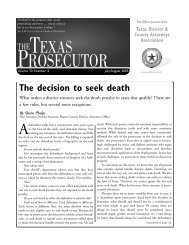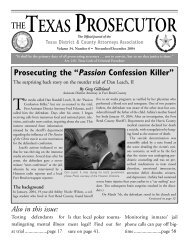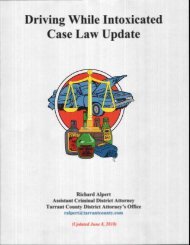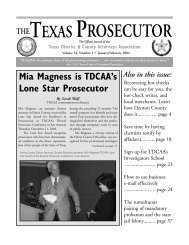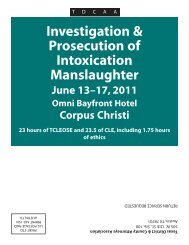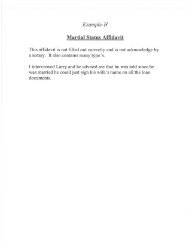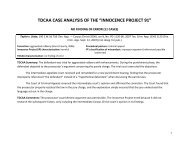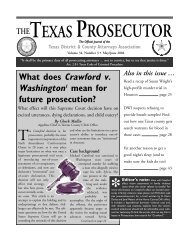Driving While Intoxicated Case Law Update - Texas District ...
Driving While Intoxicated Case Law Update - Texas District ...
Driving While Intoxicated Case Law Update - Texas District ...
Create successful ePaper yourself
Turn your PDF publications into a flip-book with our unique Google optimized e-Paper software.
Sutton v. State, 899 S.W.2d 682 (Tex.Crim.App. 1995).<br />
Heard v. State, 665 S.W.2d 488 (Tex.Crim.App. 1984).<br />
Booher v. State, 668 S.W.2d 882 (Tex.App.-Houston [1st Dist] 1984, pet. ref'd).<br />
Miller v. State, 341 S.W.2d 440 (Tex.Crim.App. 1960).<br />
State entitled to when drug use evidence cornes oltt, even though not alleged in charge.<br />
2. NOT FOR "FATIGUE''<br />
Atkins v. State, 990 S.W.2d 763 (Tex.App.-Austin 1999, no pet.).<br />
Held to be error, albeit harmless, when court gave synergistic charge that spoke to defendant's<br />
"allowing his physical condition to deteriorate." Court distinguishes fhrs instruction from other<br />
synergistic charge situations and holds it bordered on comment on weight of evidence.<br />
3. NOT FOR "THEORY OF INTOXICATION NOT ALLEGED''<br />
Barron v. State , 2011 WL 5375115 (Tex.Crim.App. 2011).<br />
Trial court's error in giving "synergistic effect" instruction regarding enhanced effects when individual<br />
combines alcoholwith medication was not harmless. Af trialthere was no evidence that defendant<br />
had ingested any medication or intoxicating substance otherthan alcohol. Jury had heard definition<br />
of intoxication, and erroneous instruction emphasized State's evidence of combination by suggesting<br />
specific mode of action through which use of "medication or drug" together with use of alcohol could<br />
produce intoxication.<br />
Rodriouez v. State, 18 S.W.3d 228 (Tex.Crim.App.2000).<br />
Defendant in this felony DWt triat was alleged to have been intoxicated by the introduction of<br />
"alcohol" into his body. There was testimony at trial by defendant that he had not been drinking<br />
alcohol but had taken cold/flu medication (Contact) that made him drowsy. The charge allowed the<br />
jury to convict if they found the defendant intoxicated "by reason of the introduction of alcohol, a<br />
drug, or a combination of both of these subsfances" intothe body. The State argued th*leard and<br />
Suffon casespermitted this butthe Court pointed outthat Heard and Sutton only speakto charging<br />
that a subsfance made a suspecf more susceptible to alcohol while this expanded the theory by<br />
allowing conviction on theory of introducing a drug into the body.<br />
F. GENERALVERDICT'FORM<br />
Bradford v. State,230 S.W.3d719 (Tex.App.-Houston [14th Dist.] 2007, no pet.).<br />
Fullenwider v. State, 176 S.W.3d 290 (Tex.App.-Houston [1st <strong>District</strong>l2004, pet. ref'd).<br />
Torres v. State, 109 S.W.3d 602 (Tex.App.-Fort Worth 2003, no pet.).<br />
Trial Court properly denied request for specific'verdict form in DWI trial. Srnce the definition of<br />
Lt6



